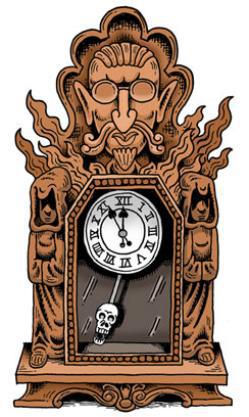Joseph Campbell never got around to cataloging one peculiar, tea-and-crumpety subspecies of his Reluctant Hero archetype: The feckless Brit drawn into a world of danger who, after a series of trials, learns how to get his feck on.
The Hitchhiker’s Guide to the Galaxy’s Arthur Dent, Neverwhere’s Richard Mayhew, Kraken’s Billy Harrow—all men of inaction who find the quiet comfort of their unexamined lives abruptly made noisy, uncomfortable, and existentially interrogated by Adventure. It causes them to undergo change, the kind of change that gives rise to wisdom, almost as a metabolic by-product. By book’s end, soft bellies grow lean, flabby arms gain sinew, and once-narrow horizons get permanently and often violently expanded.
Add to their number Joe Spork, the quiet, unassuming clock-repairer at the heart of Nick Harkaway’s big, gleefully absurd, huggable bear of a novel, Angelmaker. When we meet him, Joe is a creature of distinctly untested mettle. Untested, that is, until the day he gets duped into activating a strange clockwork beehive that is either a doomsday machine or a device that forces people to be completely honest with one another. Of course, as Harkaway delightedly points out, to the British mindset, the two are effectively synonymous.
Joe is promptly beset by veiled monks, sinister civil servants, and an infamous serial killer. Most ostentatiously, he must face the dreaded Opium Khan, aka Shem Shem Tsien, a possibly immortal, definitely voluble, downright Bondian super-villain given to boastful self-mythologizing—and rug-pulling misdirection, as in this soliloquy:
“Once upon a time, not so very long ago, there was a boy born in the nation of Addeh Sikkim, in the royal palace, who wanted nothing more than to lead his people into a new world of prosperity and hope. He was suited to the task: clever and able and well-favored.” The Opium Khan looked nostalgic.
“I locked him in a steel box and burned him alive.”
by Nick Harkaway
Knopf
Joe is a hero, though an unwitting one—he remains in the dark about just what the hell is going on for the bulk of Angelmaker’s nearly 500 pages. But every hero must eventually come into his power, the thing that makes him special. For Joe, this power doesn’t reside in a magic ring or arcane knowledge, but in his family name; he is the only son of London’s most notorious gangster. It is an existence he has flatly rejected in favor of a quiet, honest life among his flywheels and jewelers’ loupes, but as his enemies close in, and the world may or may not be ending, he will tentatively reach out to that old life, and begin to tap into the vast criminal empire that is his birthright.
Books like this, in which a vast, central mystery slowly comes to light, are beholden to their pacing. A Dan Brown novel, for all its globe-trotting, can feel like an Olympic biathlon—lots of rushing around punctuated by periodic bouts of gunfire. But Harkaway’s prose is playful and beguiling, with a keen satiric edge, and that makes all the difference.
Harkaway isn’t simply a funny writer; he adroitly uses humor to slide us gently into a given scene or character, and then invites us to settle in and root around a bit, the way you wiggle your toes once you’ve slipped on a comfortable boot. The result is certainly not for everyone; Harkaway indulges a British fondness for hyperliterate circumlocution, which means even throwaway characters tend to sound like Pythons and a seduction scene can read like this:
She rests a finger on his nose. “Hush. Pay attention.”
He nods: yes, ma’am.
“I shall now explain my plan. You may then speak, but only to amend the detail. The broad outline is not subject to negotiation. Are you ready? Good … . I propose to have sex with you. I believe it will be excellent sex. Your obedience on one particular issue of timing will be required to make it unforgettable sex. I will explain that issue as we go. At the moment, I wish to hear your inevitable objection to the general sex part of this plan.”
See? Not for everyone. In fact, more than one reviewer of Harkaway’s first novel, 2008’s post-apocalyptic satire The Gone-Away World, complained about its momentum being sapped by jokey, discursive passages. (Being critics, they called them longueurs.) But here, at least, the jokes land; more than once I found myself favorably inclined toward a given character, only to have one of those shaggy-dog digressions tip me the rest of the way over.

Harkaway splits the novel’s first half between Joe’s present day and the Cold War era, in which a young female superspy faces off against the aforementioned Shem Shem Tsien. Harkaway is the son of John Le Carré, and displays what certainly seems like perverse glee in rejecting his father’s affectless, bureaucratic take on the spy game for a defiantly fantastical one. It’s fun to imagine the old boy wincing at a flatly impossible submarine outfitted like an Edwardian gentlemen’s club, clockwork robots, and mechanical bees capable of perfecting the human soul.
Harkaway has written a pleasantly roomy book, a grand old manor house of a novel that sprawls and stretches and invites you to do likewise on any one of its richly tufted fainting couches. And it arrives at a propitious time. The current publishing vogue for Nordic grimness, for austerity and efficiency, for tattooed girls who kick this or play with that against a compulsively readable backdrop of rape and revenge, has produced a raft of books that feel less like a manor house, and more like your first apartment: a tiny white room with cinderblock bookshelves and Ikea barstools of vaguely ruthless design.
Of course, there are times when a crisp, unflinching tone serves a story, when fiction is a dish best served cold. But with Angelmaker Harkaway argues that high stakes and humor are not mutually exclusive. Even though jokes are often employed to break the tension, there is much more to the comic than comic relief.
Humor, used deftly, enriches prose, warms us to characters, and causes the tightest plot thread to loosen agreeably. In passage after passage, Angelmaker opens up, making room for the reader, until we aren’t merely empathizing with Joe Spork’s plight but feeling it keenly. When sinister officials grind Joe up in the gears of the State, his pain is our pain—imagined but wholly real, like a phantom limb. And when he finally gets pushed far enough to fight back, we find ourselves looking around the subway car for someone, anyone, to high-five.
That’s the power of sheer, doughty agreeableness. Antiheroes who reflect our basest, ugliest selves are thick on the ground, and that’s unlikely to change. All the more reason to applaud Harkaway for creating Joe Spork: not only like us but likable, a hero who serves not as a dark mirror but as a funhouse one.
See all the pieces in the new Slate Book Review.
